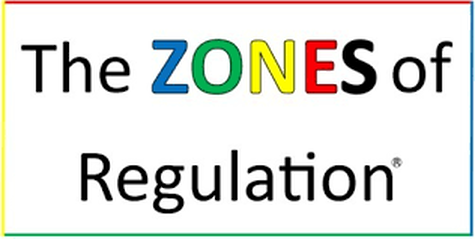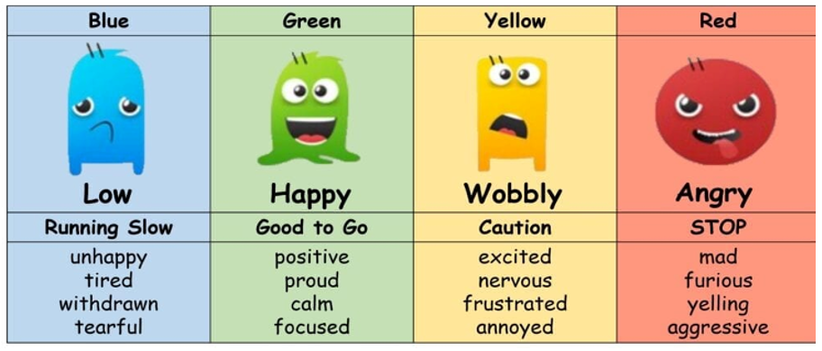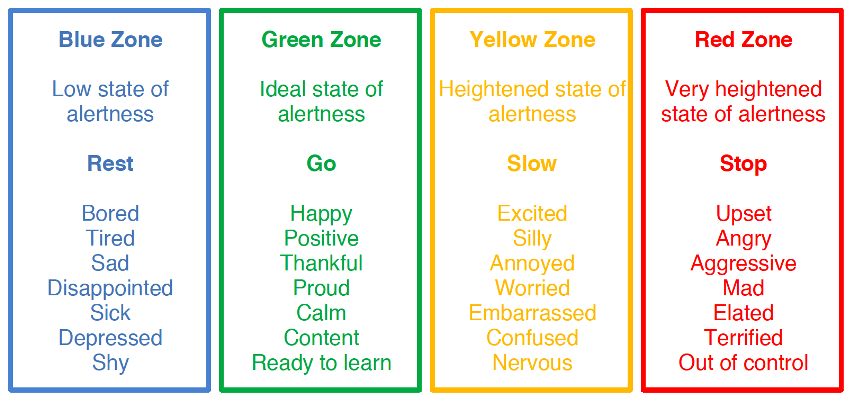Zones of Regulation
The Zones of Regulation is an internationally-renowned intervention which helps children to manage difficult emotions, known as ‘self-regulation’.
The Zones of Regulation are used throughout our whole school. We want to teach all of our children good coping and regulation strategies so they can help themselves when they experience anxiety and stress. In the classroom, sometimes children panic when faced with a tricky learning problem or challenge. By teaching them how to cope with these feelings, we might make them better at tackling learning challenges and build better resilience so they don’t give up so easily when faced with difficulty.
We want children at Marsh Gibbon CE School to grow into successful teenagers then adults. Teaching the children at a young age about managing their feelings will support them in later life so that they don’t turn to negative coping strategies which affect their mental and physical wellbeing.
Self-regulation can go by many names such as ‘self-control’, ‘impulse management’ and ‘self-management’. Self-regulation is best described as the best state of alertness for a situation. For example, when your child takes part in a sports game, they would need to have a higher state of alertness than when, for example, they were working in a library.
From time to time, all of us (including adults) find it hard to manage strong feelings such as worry, anger, restlessness, fear or tiredness, and this stops us from getting on with our day effectively. Children who feel these emotions often find it hard to learn and concentrate in school. The Zones of Regulation aims to teach children strategies to help them cope with these feelings so they can get back to feeling calm and ready to learn. These coping strategies are called ‘self-regulation’.
The Zones of Regulation are used throughout our whole school. We want to teach all of our children good coping and regulation strategies so they can help themselves when they experience anxiety and stress. In the classroom, sometimes children panic when faced with a tricky learning problem or challenge. By teaching them how to cope with these feelings, we might make them better at tackling learning challenges and build better resilience so they don’t give up so easily when faced with difficulty.
We want children at Marsh Gibbon CE School to grow into successful teenagers then adults. Teaching the children at a young age about managing their feelings will support them in later life so that they don’t turn to negative coping strategies which affect their mental and physical wellbeing.
Self-regulation can go by many names such as ‘self-control’, ‘impulse management’ and ‘self-management’. Self-regulation is best described as the best state of alertness for a situation. For example, when your child takes part in a sports game, they would need to have a higher state of alertness than when, for example, they were working in a library.
From time to time, all of us (including adults) find it hard to manage strong feelings such as worry, anger, restlessness, fear or tiredness, and this stops us from getting on with our day effectively. Children who feel these emotions often find it hard to learn and concentrate in school. The Zones of Regulation aims to teach children strategies to help them cope with these feelings so they can get back to feeling calm and ready to learn. These coping strategies are called ‘self-regulation’.
Our Intent is to help children to:
- Recognise when they are in the different Zones and learn how to change or stay in the Zone they are in.
- Increase their emotional vocabulary so they can explain how they are feeling.
- Recognise when other people are in different Zones, thus developing better empathy.
- Develop an insight into what might make them move into the different Zones.
- Understand that emotions, sensory experiences such as lack of sleep or hunger and their environment might influence which Zone they are in.
- Develop problem-solving skills and resilience
- Identify a range of calming and alerting strategies that support them
What are the different zones?
Blue Zone: low level of arousal; not ready to learn; feels sad, sick, tired, bored, moving slowly.
Green Zone: calm state of alertness; optimal level to learn; feels happy, calm, feeling okay, focused.
Yellow Zone: heightened state of alertness; elevated emotions; has some control; feels frustrated, worried, silly/wiggly, excited, loss of some control.
Red Zone: heightened state of alertness and intense emotions; not an optimal level for learning; out of control; feels mad/angry, terrified, yelling/hitting, elated, out of control.
Green Zone: calm state of alertness; optimal level to learn; feels happy, calm, feeling okay, focused.
Yellow Zone: heightened state of alertness; elevated emotions; has some control; feels frustrated, worried, silly/wiggly, excited, loss of some control.
Red Zone: heightened state of alertness and intense emotions; not an optimal level for learning; out of control; feels mad/angry, terrified, yelling/hitting, elated, out of control.






